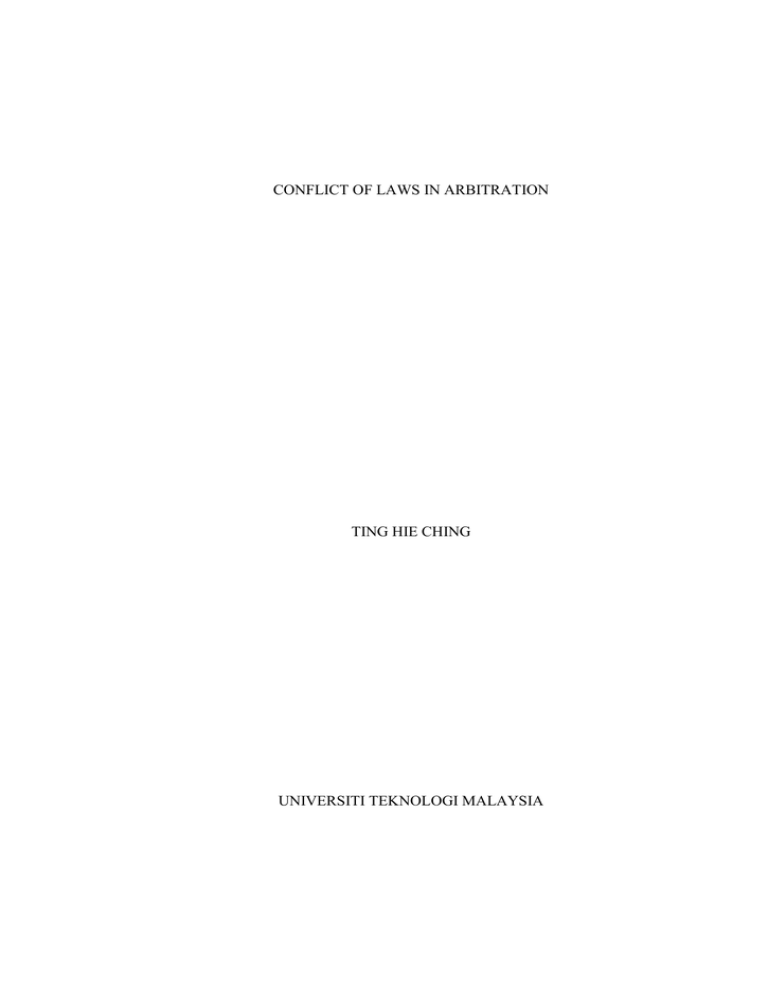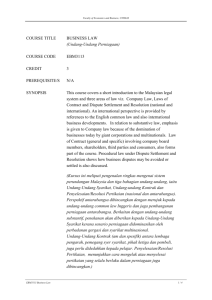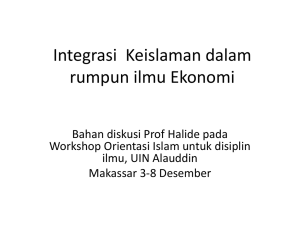CONFLICT OF LAWS IN ARBITRATION TING HIE CHING UNIVERSITI TEKNOLOGI MALAYSIA
advertisement

CONFLICT OF LAWS IN ARBITRATION TING HIE CHING UNIVERSITI TEKNOLOGI MALAYSIA CONFLICT OF LAWS IN ARBITRATION TING HIE CHING A thesis submitted in fulfillment of the requirements for the award of the degree of Master of Construction Contract Management Faculty of Built Environment Universiti Teknologi Malaysia SEPTEMBER 2012 iii DEDICATION Special thanks to my parents, my sister, my brothers and friends for their help and understanding Thanks for Everything…. iv ACKNOWLEDGEMENT I would like to take this opportunity to record my sincere appreciation to those who has been helping me throughout the research. The research would not have been successful without the great support, sacrifice and generous contributions from various parties. First of all, I would like to thank my supervisor, Dr. Nur Emma Binti Mustaffa for her guidance, encouragement, concerns, advice and support in order to complete this dissertation. Not forgetting my dearest parents, sister and brothers, a token of appreciation goes to them for all the support given. Lastly, I would like to thank all my friends for their support and dedication in helping me to complete this research. Thank you very much. v ABSTRACT Generally, arbitration is preferred as an effective method of settling disputes between the parties which are from different countries. Conflict of laws is a part of English law that we will use whenever we face a legal problem which has a foreign element in it. Conflict of laws is defined as a conflict between the laws of two or more states or countries that would apply to a legal action in which the underlying disputes, transaction or event affects or has a connection to those jurisdictions. This research is on conflict of laws in arbitration. The objective of this study is to determine the grounds to solve conflict of laws in arbitration. This study covers the legal cases in England which are related to conflict of laws in arbitration. The methodology of this study has been based on documentary analysis. The research findings show that the grounds to solve the conflict of laws in arbitration are jurisdiction, choice of law and enforcement and recognition of foreign judgment. The court must have jurisdiction to settle the dispute as provided in the agreement signed between both parties. When there was an express or implied choice of law in arbitration, the parties would apply the law as expressed in the agreement. However, in the absence of express or implied choice of law, the parties would apply English conflict of laws rules to determine the dispute. The English court would recognize and enforce the foreign judgment if the judgment was final and conclusive. vi ABSTRAK Secara umumnya, timbang tara adalah kaedah yang lebih berkesan untuk menyelesaikan pertikaian antara pihak-pihak dari negara-negara yang berbeza. Konflik undang-undang adalah sebahagian daripada undang-undang Inggeris yang akan kita gunakan apabila kita berhadapan dengan masalah undang-undang yang mempunyai unsur asing. Konflik undang-undang yang ditakrifkan sebagai konflik antara undang-undang dua negeri atau lebih atau negara-negara yang akan dikenakan tindakan undang-undang di mana pertikaian yang mendasari, urusniaga atau peristiwa yang menjejaskan atau mempunyai hubungan kepada bidang kuasa mereka. Kajian ini adalah mengenai kes konflik undang-undang di dalam timbang tara. Objektif kajian ini adalah untuk menentukan alasan untuk menyelesaikan konflik undang-undang di dalam timbang tara. Kajian ini meliputi kes-kes undang-undang di England dan kes-kes yang berkaitan dengan konflik undang-undang di dalam timbang tara. Metodologi kajian ini adalah berdasarkan analisis dokumentari. Dapatan kajian mendapati bahawa alasan untuk menyelesaikan konflik undangundang di dalam timbang tara adalah bidang kuasa, pilihan undang-undang dan penguatkuasaan dan pengiktirafan penghakiman asing. Mahkamah mesti mempunyai bidang kuasa untuk menyelesaikan pertikaian itu sebagaimana yang diperuntukkan dalam perjanjian yang ditandatangani antara kedua-dua pihak. Apabila terdapat pilihan nyata atau tersirat undang-undang di dalam timbang tara, pihak-pihak akan menggunakan undang-undang seperti yang dinyatakan dalam perjanjian itu. Walaubagaimanapun, jika tiada pilihan nyata atau tersirat undangundang, pihak-pihak akan menggunakan peraturan konflik undang-undang Inggeris untuk menentukan pertikaian itu. Mahkamah Inggeris akan mengiktiraf dan menguatkuasakan penghakiman asing jika penghakiman itu adalah muktamad dan konklusif.


